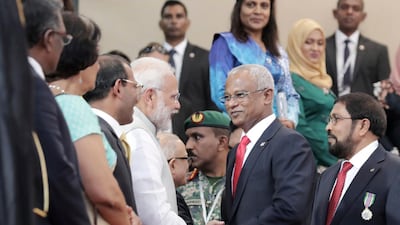The new president of the Maldives took office on Saturday, declaring the state coffers to have been looted and warned that the country was in financial difficulty after racking up debt with Chinese lenders in an infrastructure boom.
The Maldives, famous for its luxury resorts on palm-fringed islands, is the latest in a number of small countries where China has invested millions of dollars building highways and housing as part of its Belt and Road Initiative.
But these projects have left the country of just over 400,000 people in debt and prompted calls for investigations into how contracts were awarded to Chinese companies during the previous administration.
"As I take over the presidency, the state's financial situation is precarious. The damage done due to projects conducted only for political reasons, and at a loss, are huge," said Ibrahim Mohamed Solih in a speech soon after he was sworn in as president.
Prime Minister Narendra Modi of India, which is seeking to claw back ground in a country it considered as part of its area of influence, was the highest ranking foreign visitor at the ceremony held in a soccer stadium in the capital Male.
The surprise defeat of pro-China strongman Abdulla Yameen has opened a window for India, the strategic outpost's traditional political partner, to regain ground lost to Beijing in their tussle for regional dominance.
Mr Modi's presence signals the end of years of frosty relations because of Mr Yameen's embrace of China, a relationship that had deepened India's anxieties about being encircled by countries leaning towards Beijing.
Mr Solih, a veteran lawmaker, won the presidential election in September.
"The state coffers have lost several billions of rufiyaa (local currency) due to embezzlement and corruption conducted at different levels of the government," Mr Solih said.
He said it wasn't clear how much the state had lost. His transition team said this week it would conduct a forensic audit of deals sealed by the Mr Yameen administration, many of them with Chinese state firms.
The big worry for Mr Solih's team is the debt the country has run up with Chinese lenders for projects such as a mile-long sea bridge connecting the airport to the capital, the airport expansion itself and massive housing projects on reclaimed islands.
Mr Solih's transition team said it had been told the country owed $1.5 billion to Chinese lenders, but fear it could be much higher. Even a debt of $1.5 billion would be more than a quarter of the country's annual gross domestic product.
Mr Modi told Mr Solih that India stood ready to help the Maldives through its economic difficulties, the Indian foreign ministry said in a statement following their meeting.
India, which has long been the Maldives' main political and economic partner, had grown concerned that China's expansive diplomacy was aimed at establishing an outpost on the islands.
China has already gained a strong foothold in Sri Lanka, just off the southern coast of India, where it has a built a port and now controls it in a debt-for-equity swap.
Mr Modi and Mr Solih agreed the two countries would be mindful of each other’s concerns and the need for stability in the Indian Ocean, the Indian foreign ministry said in the statement.
China has said it hoped there would be continuity in policies during Mr Solih's presidency and it would create good conditions for Chinese firms.

